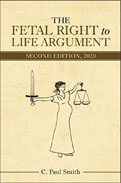
 |
Any argument about abortion, whether in favor or against, will necessarily involve a companion discussion about what constitutes life. Is the life referred to biological or spiritual? When do biological and spiritual life, respectively, begin? The 1973 Supreme Court decision Roe v. Wade is silent on the distinction. Most pro-life activists are not. Usually, on religious grounds, they maintain that biological and spiritual life commence together. Today more than fifty years after the landmark case, the pro-choice view has expanded to include the contention that a fetus with the potential to inherit genetic disorders and physical malformations that would cause pain and suffering throughout life has the right not to be born. In such cases, abortion would be an act of mercy to the unborn, they say. Whatever one's opinion, Roe v. Wade assures a woman's rights to privacy and physical autonomy, but did it also dispense with morality?
Smith is a seasoned lawyer who also belongs to the Church of Jesus Christ of Latter-Day Saints. He supports the decidedly pro-life views he expresses in this essay with extensively researched legal arguments. He relies more on these than on religious texts such as the Bible or the Book of Mormon. He originally published the volume in 1977. His updated version successfully addresses current issues, such as gay rights and its companion issue of same-sex marriage, detailing a 1978 case in which a gay couple invoked Roe v. Wade, asserting that the right to privacy of sexual practice it championed also extended to men. Smith's writing is likely to interest both male and female pro-life advocates, particularly those of various Christian persuasions.